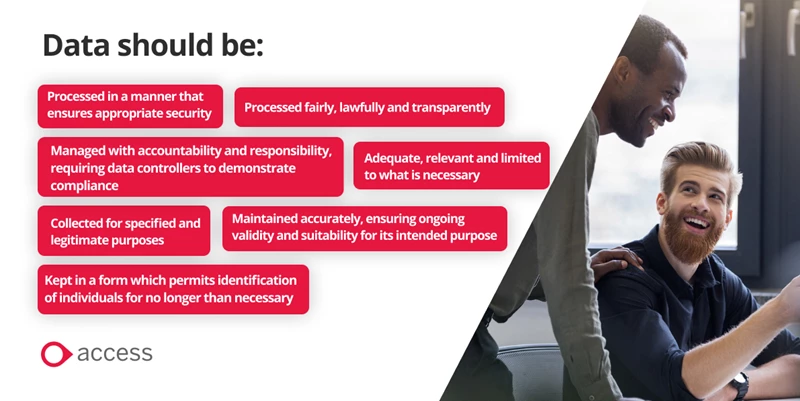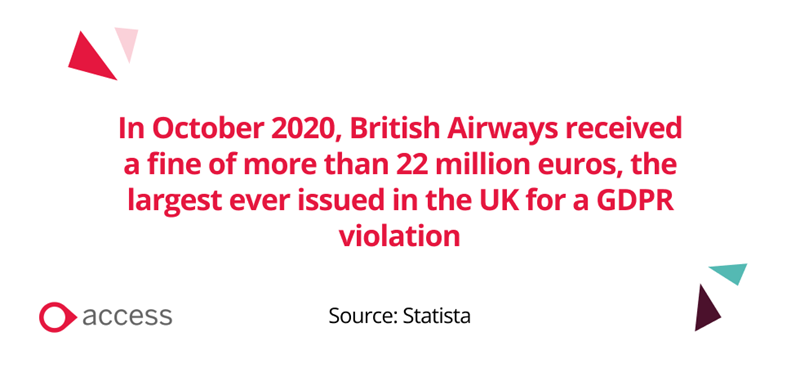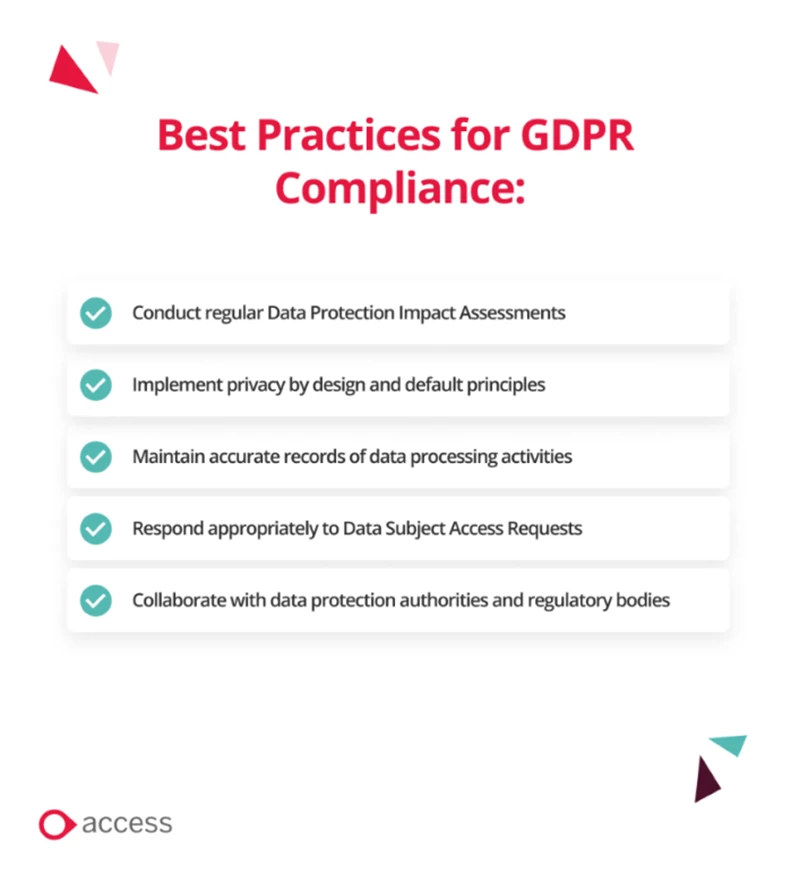Unlock the secrets to GDPR Compliance: Essential Data Privacy Training
The importance of GDPR compliance has never been more relevant, but it can be tricky to know where to start.
Assigning data privacy training throughout your organisation is crucial for maintaining GDPR compliance and ensuring that employees grasp the policies, procedures, and general best practices.
In this article we are going to talk about how to be GDPR compliant no matter the business size, discuss accountability and answer the question ‘what is a data protection impact assessment?'

Understanding GDPR Compliance
Let’s start things off by talking about GDPR regulations. Implemented in May 2018, the General Data Protection Regulation was introduced to apply rules which give individuals much more control over their personal data and how it's used.
Organisations must now have a clear purpose for collecting and retaining personal data, and give individuals the option to review, amend or challenge the practices.
The seven key principles of GDPR
The updated regulations consist of seven key principles. According to these, data should be:
- Processed fairly, lawfully and transparently
- Collected for specified and legitimate purposes
- Adequate, relevant and limited to what is necessary
- Maintained accurately, ensuring ongoing validity and suitability for its intended purpose
- Kept in a form which permits identification of individuals for no longer than necessary
- Processed in a manner that ensures appropriate security
- Managed with accountability and responsibility, requiring data controllers to demonstrate compliance

How to be GDPR Compliant: Scope and applicability
General Data Protection Regulations applies to a wide range of groups and individuals involved in processing personal data within the European Union and also applies outside the EU. However, this is only applicable if they offer goods or services to, or monitor the behaviour of, individuals within the EU.
Below are the groups that GDPR compliance and accountability applies to:
Data Controllers: Organisations or individuals determining the purposes and means of processing personal data.
Data Processors: Those who process personal data on behalf of data controllers.
Businesses: Any business that collects or processes personal data of individuals in the EU.
Service Providers: Any organisation offering goods or services to EU residents, regardless of whether a payment is required.
Data Subjects: GDPR is designed to protect the rights and privacy of EU citizens and residents, so it applies to the personal data of these individuals.
Third Parties: Any third-party that may access or process personal data on behalf of data controllers or processors.
Online Platforms: Online platforms that collect or process personal data of EU individuals.
Employers: Companies that collect and process personal data of employees, job applicants, or contractors in the EU.
Public Authorities and Bodies: GDPR applies to public authorities and bodies processing personal data, subject to certain limitations and derogations.

The importance of GDPR compliance for businesses
For a business of any size to succeed, they must have a thorough understanding of, and abide by the GDPR compliance principles. In order to do so, all employees should receive comprehensive data protection training to give them the tools and information needed to process data correctly.
The largest fine issued for a GDPR violation in the UK was more than 22 million euros received by British Airways in October 2020. However, the cost to a business if a GDPR breach occurs can be damaging from both a monetary and reputational perspective. If a business is not compliant with GDPR policies and procedures, they risk losing customers which directly impacts turnover, but also it can hurt the reputation of a company, something that is often much harder to recover from.
Let’s explore the different sizes of business and how they can be impacted by GDPR compliance.
GDPR Compliance for Small Businesses
No matter the size of your business, you must comply to data protection laws. This means that though they may not have as much data to process, small to medium sized businesses (SMBs) still need to adhere to the data protection principles. However, they may face challenges such as:
- Limited resources and manpower
With fewer staff members available, dedicating time and resources to ensure GDPR compliance is met can be a tricky task. However, reduced numbers also mean that with proper training and education, it's more feasible to ensure that everyone within the organisation understands their responsibilities and can achieve compliance with ease.
- Difficulty conducting thorough data mapping and inventory exercises
SMBs may face difficulties in conducting data mapping and inventory exercises, particularly if data is stored across multiple systems. An example of this would be a small company collecting customer information from their website, social media, and email campaigns, making it challenging to track and manage data effectively.
- Reputational and monetary damage that comes with data breaches
Data breaches can be detrimental to any size company, but it can be particularly difficult for small businesses. The negative publicity can tarnish their reputation, and fines may make it difficult for a smaller company to grow organically and gain new customers.
Ensuring everybody who needs it has the right training will help your small business handle GDPR compliance with ease. It can also help build trust with customers, showing to them that despite having limited resources, you are making sure their information is safe and being handled in accordance with legal requirements.
GDPR Compliance for Large Organisations
For large organisations, there are a different set of unique challenges to overcome. These include:
- Managing, tracking and handling a large volume of data from various sources
Large businesses handle a lot of data from different places like customer interactions, internal processes, and partnerships. Dealing with so much data can make it difficult to organise, track, and follow GDPR compliance principles effectively.
- Establishing GDPR compliance frameworks and governance structures
Being responsible for the correct handling of large amounts of data often requires the use of a compliance framework which sets out a formalised process on how to deal with these. Once this framework is in place within an organisation, it can be adhered to easily, but they must create one first.
More information on frameworks can be found here: The GDPR and Privacy Compliance Frameworks (itgovernance.co.uk)
- Handling data transfers across countries and international compliance
Large businesses often don’t just deal with EU regulations, but also international compliance when transferring data across borders. Navigating these complexities to uphold GDPR principles and safeguard data privacy rights across international operations often requires additional protocols which need to be taken into consideration.
- Ensuring accountability and transparency in data processing activities
While this is true for any business, large businesses may face more scrutiny in their accountability efforts. Demonstrating GDPR compliance through carrying out Data Protection Impact Assessments (DPIAs), maintaining detailed and accurate records of compliance and potentially appointing a data protection officer are all good approaches to take, but may require additional efforts to do so.
Implementing robust data protection policies and procedures will help ensure all of the above challenges are handled efficiently. Access Learning GDPR training can help large organisations by offering targeted compliance eLearning at scale. Offering learning strategies that directly respond to these with easy-to-digest content will keep everyone up to speed with important principles.
GDPR Best Practice: 5 Considerations
Now we've covered GDPR compliance challenges for all business sizes, let’s look at best practices. Below are five steps you should be following when looking at data compliance practices within your organisation.
1. Conduct regular Data Protection Impact Assessments
Regularly conducting Data Protection Impact Assessments is vital for compliance. By integrating DPIAs into operational processes, businesses can stay ahead of evolving risks and stay compliant.
What is a Data Protection Impact Assessment?
A DPIA is a process for assessing and managing the risks associated with data processing activities. It helps organisations identify and mitigate potential privacy risks to individuals' data.
You can find out more about DPIAs on the ICO website.
2. Implement privacy by design and default principles
Privacy by design and default are two principles which advocate for the embedding of privacy protections into the design and operation of systems, products, and processes. This means integrating privacy considerations into the earliest stage of development, rather than addressing them later down the line.
An example of this would be a company developing a mobile app which collects user data. If they implement encryption processes at this stage, they reduce the risk of data breaches. By doing so, businesses can enhance data protection, reduce the risk of privacy breaches, and demonstrate GDPR compliance.
3. Maintain accurate records of data processing activities
Maintaining accurate records of data processing activities is an essential aspect of GDPR accountability and compliance. Keeping comprehensive documentation can help create an audit trail which will demonstrate accountability to regulatory authorities. These should include:
- the purposes of data processing
- the types of data involved
- the categories of data subjects
- details of any third-party data sharing
4. Respond appropriately to Data Subject Access Requests
GDPR grants individuals the right to obtain information around what data is being held by an organisation and how their data is being processed and stored. These Data Subject Access Requests (DSARs) can be made by any individual and therefore, it's important to establish efficient processes for handling DSARs to ensure regulations are met.
5. Collaborate with data protection authorities and regulatory bodies
Organisations should engage in open communication with relevant authorities, such as data protection supervisory authorities, to seek guidance on compliance matters, report data breaches, and address any concerns or inquiries.

Tools and Resources for GDPR Compliance
As we have discussed, using best practices can help with following GDPR compliance successfully, but there are also various tools than can be utilised to make this process even easier. Let’s explore these in a bit more detail:
Official GDPR guidelines and documentation
There are many resources available online which can help you manage your GDPR compliance. Below are some helpful webpages from the ICO (Information Commissioner’s Office) which provides useful information and guidance:
UK GDPR guidance and resources | ICO
Advice for small organisations | ICO
Compliance frameworks and assessment tools
Compliance frameworks and assessment tools are essential for organisations dealing with GDPR rules. They provide structured steps to check current practices, find any problems, and fix them to meet GDPR standards. These resources come in various forms, like detailed frameworks from experts and software that can automatically spot issues and map out data.
GDPR Compliance training
GDPR compliance and data privacy training can be tailored to cover key GDPR principles, such as data minimization, consent management, and data subject rights, equipping employees with the knowledge and skills necessary to handle personal data securely and in compliance with GDPR regulation.
How to be GDPR compliant through Access Learning
Access GDPR Compliance training is part of our market-leading Governance, Risk and Compliance suite of modules, offering targeted and relevant training that is accredited by CPD and written in partnership with subject matter experts and industry specialists.
The course includes:
- Key principles of GDPR compliance
- Practical exercises and simulations
- Learning to suit all industries
We ensure all of our learning content is available anywhere, from any device, making it accessible for all users.
You can find out more about our Data Protection and GDPR training for employees, or any part of our Governance, Risk and Compliance content by speaking to one of our learning experts.
Enhance Governance, Risk and Compliance with Access Learning
It's essential to provide your workforce with accredited compliance training.



